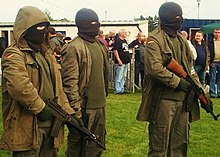
The Troubles were an ethno-nationalist conflict in Northern Ireland that lasted for about 30 years from the late 1960s to 1998. Also known internationally as the Northern Ireland conflict, it began in the late 1960s and is usually deemed to have ended with the Good Friday Agreement of 1998. Although the Troubles mostly took place in Northern Ireland, at times violence spilled over into parts of the Republic of Ireland, England, and mainland Europe.
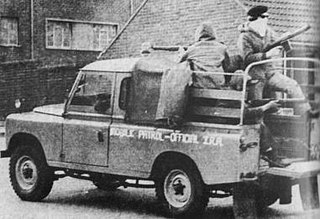
The Official Irish Republican Army or Official IRA was an Irish republican paramilitary group whose goal was to remove Northern Ireland from the United Kingdom and create a "workers' republic" encompassing all of Ireland. It emerged in December 1969, shortly after the beginning of the Troubles, when the Irish Republican Army (IRA) split into two factions. The other was the Provisional IRA. Each continued to call itself simply "the IRA" and rejected the other's legitimacy.
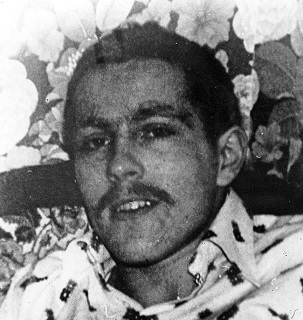
Francis Joseph Sean Hughes was a volunteer in the Provisional Irish Republican Army (IRA) from Bellaghy, County Londonderry, Northern Ireland. Hughes was the most wanted man in Northern Ireland until his arrest following a shoot-out with the British Army in which a British soldier was killed. At his trial, he was sentenced to a total of 83 years' imprisonment; he died during the 1981 Irish hunger strike in HM Prison Maze. Hughes was one of 22 Irish republicans who died on hunger-strike between 1917 and 1981.

From 1969 until 1997, the Provisional Irish Republican Army (IRA) conducted an armed paramilitary campaign primarily in Northern Ireland and England, aimed at ending British rule in Northern Ireland in order to create a united Ireland.
The following outline is provided as an overview of and topical guide to the Troubles.
The Troubles were a period of conflict in Northern Ireland involving republican and loyalist paramilitaries, the British security forces and civilians. They are usually dated from the late 1960s to the Good Friday Agreement of 1998. However, sporadic violence has occurred since that time, with those involved often being referred to as "dissident republicans and loyalists". The Troubles, sometimes known internationally as the Northern Ireland conflict, claimed roughly 3500 lives.
On 28 February 1985, the Provisional Irish Republican Army (IRA) launched a heavy mortar attack on the Royal Ulster Constabulary (RUC) base at Corry Square in Newry, County Down, Northern Ireland. The attack killed nine RUC officers and injured almost 40 others; the highest death toll ever suffered by the RUC. Afterwards, a major building scheme was begun to give police and military bases better protection from such attacks.
The Battle of St Matthew's or Battle of Short Strand was a gun battle that took place on the night of 27–28 June 1970 in Belfast, Northern Ireland. It was fought between the Provisional Irish Republican Army (IRA), and Ulster loyalists in the area around St Matthew's Roman Catholic church. This lies at the edge of the Short Strand, a Catholic enclave in a mainly-Protestant part of the city. Violence had erupted there, and in other parts of Belfast, following marches by the Orange Order. The battle lasted about five hours and ended at dawn when loyalists withdrew. The British Army and police were deployed nearby but did not intervene. Three people were killed and at least 26 wounded in the fighting, while another three were killed in north Belfast.
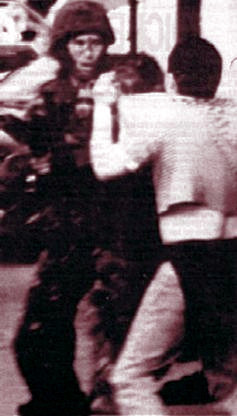
The 1992 Coalisland riots were a series of clashes on 12 and 17 May 1992 between local Irish nationalist civilians and British Army soldiers in the town of Coalisland, County Tyrone, Northern Ireland. The Third Battalion 1992 tour's codename was "Operation Gypsy".
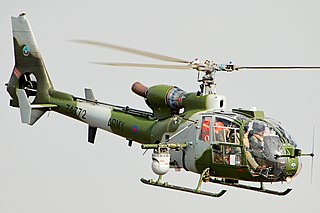
On 17 February 1978, a British Army Gazelle helicopter, serial number XX404, went down near Jonesborough, County Armagh, Northern Ireland, after being fired at by a Provisional IRA unit from the South Armagh Brigade. The IRA unit was involved at the time in a gun battle with a Green Jackets observation post deployed in the area, and the helicopter was sent in to support the ground troops. The helicopter crashed after the pilot lost control of the aircraft whilst evading ground fire.
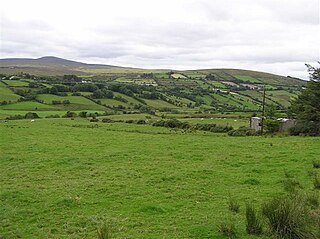
The Teebane bombing took place on 17 January 1992 at a rural crossroads between Omagh and Cookstown in County Tyrone, Northern Ireland. A roadside bomb destroyed a van carrying 14 construction workers who had been repairing a British Army base in Omagh. Eight of the men were killed and the rest were wounded. Most were civilians, while one of those killed and two of the wounded were off-duty British soldiers. The Provisional Irish Republican Army (IRA) claimed responsibility, saying the workers were targeted because they were collaborating with the "forces of occupation".
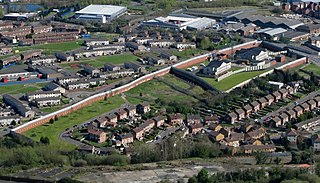
The Battle at Springmartin was a series of gun battles in Belfast, Northern Ireland on 13–14 May 1972, as part of The Troubles. It involved the British Army, the Provisional Irish Republican Army (IRA), and the Ulster Volunteer Force (UVF).

The 1973 Old Bailey bombing was a car bomb attack carried out by the Provisional IRA (IRA) which took place outside the Old Bailey Courthouse on 8 March 1973. The attack was carried out by an 11-person active service unit (ASU) from the Provisional IRA Belfast Brigade. The unit also exploded a second bomb which went off outside the Ministry of Agriculture near Whitehall in London at around the same time the bomb at the Old Bailey went off.
The Battle of Lenadoon was a series of gun battles fought over a six day period from 9–14 July 1972 between the Provisional IRA and the British Army. It started on Thursday, 9 July 1972 in and around the Lenadoon Avenue area and spread to other places in Belfast. Loyalist paramilitaries and the Official Irish Republican Army were involved in some of the incidents. 28 people in total were killed in Belfast according to the CAIN: Sutton Index of Deaths. The violence ended a two-week truce between the forces of the British Government and the IRA.

In the Ballygawley land mine attack of 13 July 1983, four soldiers of the British Army's Ulster Defence Regiment (UDR) were killed by a Provisional Irish Republican Army (IRA) land mine near Ballygawley in County Tyrone, Northern Ireland. The soldiers were travelling in a convoy of armoured vehicles when the land mine was detonated remotely.
On 11 August 1970, two Royal Ulster Constabulary (RUC) officers were killed by a booby-trap bomb planted under a car by the Provisional Irish Republican Army (IRA) near Crossmaglen, in County Armagh, Northern Ireland. They were the first RUC officers to be killed by republicans during the Troubles and the first security forces to be killed in South Armagh, an IRA stronghold for much of the conflict.
The Red Lion Pub bombing was a bomb attack on 2 November 1971 in Belfast, Northern Ireland. Planted by the Provisional IRA, it exploded in the Red Lion pub on Ormeau Road, killing three people and injuring about 30 others. The IRA members had given customers less than ten seconds to flee the building. Police said the target was the neighbouring Royal Ulster Constabulary (RUC) station.

The RTÉ Studio bombing was a 1969 bomb attack carried out by the Ulster Loyalist paramilitary group the Ulster Volunteer Force (UVF) in Dublin, Ireland. It was the first Loyalist bombing in the Republic of Ireland during the Troubles.
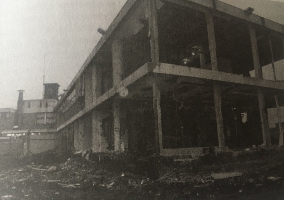
On 2 November 1991, a bomb planted by the Provisional IRA exploded in the Military Wing at Musgrave Park Hospital, Belfast. Two British soldiers were killed and nine others were wounded. Two children, a five-year-old girl and a baby of four months, were also injured by the blast.

On 12 December 1993, a unit of the Provisional Irish Republican Army's (IRA) East Tyrone Brigade ambushed a two-men unmarked mobile patrol of the RUC in Fivemiletown, County Tyrone. Two constables were shot and killed instantly. A military helicopter was also fired at by a second IRA unit in the aftermath of the incident, during a follow-up operation launched in the surroundings of the town by both the British Army and the RUC. A number of suspects were questioned, but the perpetrators escaped successfully. The action occurred just three days before the Downing Street Declaration.
